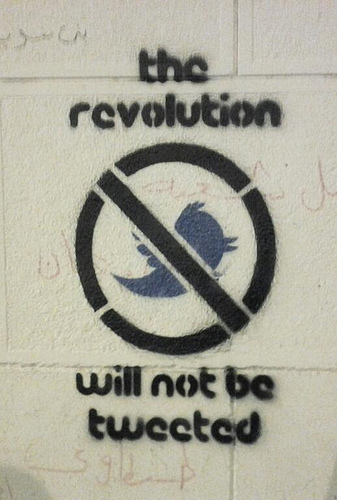Over the past couple of weeks, actor and comedian Russell Brand has been praised by several blogs and social media users for his viral video and last week’s New Statesman manifesto calling for revolution. The headlines speak for themselves: “Russell Brand May Have Started a Revolution Last Night” and “Brand is Readying the Revolution.”
As young organizers and radical thinkers, the question on our lips is: why is Brand getting so much attention, while we — the “disenfranchised underclass” — have been saying this shit for years?
Natasha Lenard articulately described why she does not stand with Brand and his so-called revolution: his complete lack of attention to dismantling patriarchy and sexism. Many other holes can be pointed to in Brand’s personal commitment to justice for oppressed peoples, from his appropriation of Native culture to his sexual exploitation of women.
But the thing that stands out to us as particularly ridiculous is how corporate media is holding Brand up as a would-be revolutionary at a time when young people of colour and women, queer kids, working class and poor youth are leading organizations that are building a robust movement across issues, strategies and identities; a movement that is not looking to celebrities or elites for direction, but is informed from below.
It is also important to recognize that Brand’s individual levels of racism and sexism are not separate from the overarching systems of racism and sexism we reside in. To continue to engage in inherently racist and sexist acts on a micro-level also showcases a lack of understanding around how it operates on a macro-level, disproportionately hurting women and people of colour.
The mainstream U.S. media, 90 per cent of which is owned by six major corporations, continues to misrepresent the people’s reality. We often see news outlets proclaim a freedom from bias, when in actuality the right and the left misconstrue current events from their connection to historical antecedents.
We see a numbness to this with the fascination with celebrities, who serve as performative spectacles. In Kim Kardashian’s lavish lifestyle, we create a false world for ourselves, one in which many are not included.
One main goal of media is to hide class divides, using wealthy props to further “progressive” conversations, including Brand and even Kanye West.
In Brand and West we see the representation is a trap. We begin to wonder if a disenfranchised former addict like Brand can become reformed and successful, so can anyone. When we see West, we are tricked into thinking black men are not only represented, but capable of becoming rich.
However, representation has widely been used to promote the false promise of meritocracy. If people like Brand and West are entertained in mass media, it becomes easier to become satisfied through mere observation and traps of representation.
Corporate-owned mass media will never empower the movements that seek to deconstruct the illusion it creates. To do so would be to contribute to the undoing of the large industry created by the state’s investment in media, which is used as a tool for social control.
Through limiting critical thought and radical action to the words of Brand and denying the coverage of youth movements, the state and its media outlets are using preventative tactic for suppressing organizing. This tactic, along with the increased militarization of the police and increased surveillance, ultimately work in tandem to squash revolt in the mind, before revolt moves into physicality.
The revolution as defined by Brand and the media is one of fiction, and it is meant to remain as such.
Here are three movements that we should be following and looking to as the voice of the struggle for revolution, instead of Russell Brand:
- People of colour-led movements for transgender and queer justice:
Beyond the mainstream movement for equality in marriage and the military, trans* and queer youth are struggling to tell their most basic truths: in their homes, in their classrooms, on the streets. Groups like FIERCE NYC are led by young LGBTQ people of color, and their work must be not only respected, but elevated as a key struggle in today’s movement for social justice.
- Movements fighting the school-to-prison pipeline, and other prison abolition movements:
From the Dream Defenders to Youth 4 Justice, multi-racial coalitions of young people (as well as intergenerational groups) are addressing issues of policing in schools by combating the school-to-prison pipeline. We should be looking to these groups for a strategy of how to build a strong prison abolition movement in the United States.
- Undocumented youth and students who are fighting for an end to deportations:
DREAMer-led organizations such as National Immigrant Youth Alliance (NIYA) are escalating their struggle and calling for #not1more undocumented immigrant to be deported through direct action. These young people are rejecting assimilationism and fighting for their own liberation. (Facebook founder Mark Zuckerberg started a tech-based project that focuses on immigration issues — he would have been better off donating money or signal-boosting the work of groups like NIYA.)
All in all, while celebrities and other elites should not be placed in the centre of a movement narrative (although we also acknowledge that media can often create this kind of celebrity amongst movement leadership), there is sometimes a need for celebrity signal boosting of authentic organizing. For instance, Talib Kweli’s open support of the Dream Defenders’ occupation of Florida Governor Rick Scott’s office brought popular attention to the direct action.
However, without accountability, celebrity signal boosting can turn into another form of the non-profit-industrial-complex, which relies on the voices and dollars of elites to promote social good, instead of boots on the ground movements informed by the experiences of those most affected by injustice.
Isabelle Nastasia is the Cofounder and Managing Editor of {Young}ist. She frequently tweets at @IzzyNastasia.
Suey Park is an Ethnic Studies MA student and aspiring writer. She frequently tweets at @suey_park.
This article originally appeared on {Young}ist and is reprinted with permission. Follow {Young}ist on twitter @theyoungist.




